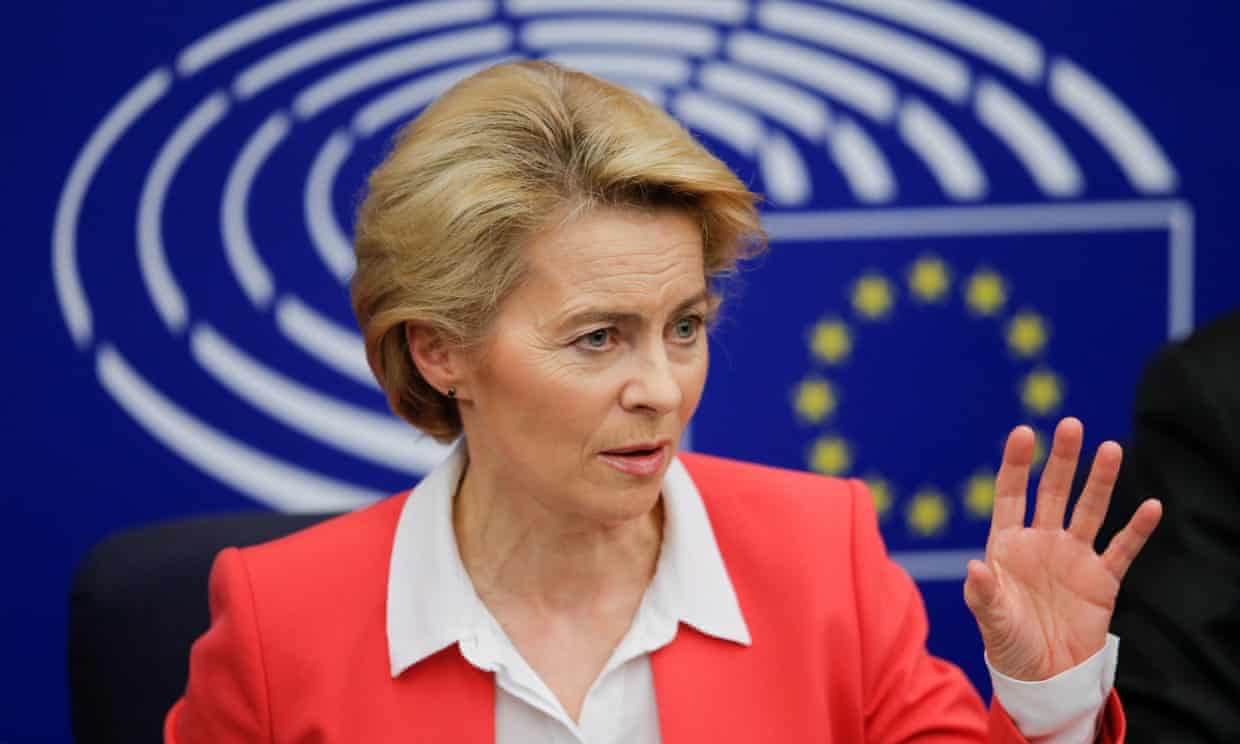
Proposed EU-wide 'climate law' would set net-zero carbon target by 2050
by Fiona Harvey, Jennifer RankinPlan is part of ‘green new deal’ but campaigners say it is not enough to tackle climate crisis
The first EU-wide “climate law” would enshrine a legally binding target of reaching net-zero carbon by 2050, and Europe’s greenhouse gas emissions would be halved by 2030, under a set of proposals being discussed by the incoming European commission.
Cars would be subject to new air pollution standards, following the disastrous cheating that allowed diesel pollutants to be masked, and all vehicles may be brought within the EU’s carbon emissions trading scheme, which would affect drivers across the bloc. Three quarters of road transport would have to be moved to rail and inland waterways, and pricing would have to be adjusted to reflect the carbon output of different modes of transport, which is likely to prove controversial.
The proposals are part of the “green new deal”, the centrepiece of the new commission’s action plan, focused on climate and the environment. Ursula von der Leyen, the new president of the commission, has pledged to bring forward the proposals within 100 days of taking office on 1 December.
According to a draft seen by the Guardian, moving to zero transport emissions will be a key goal, as will radical reform of the common agricultural policy, which has been widely criticised in recent years for drastic damage to the natural environment. There will be measures for an EU-wide industrial strategy, and innovation funding for promising clean technologies.
The central pledge to cut greenhouse gases by “at least 50% and towards 55% in a responsible way” had been long expected, but will not satisfy green campaigners, who say more urgent action is needed. Many measures in the five-page draft are also still vague, missing or hedged with question marks, and many have no firm target date attached.
Ministers and government officials from around the world are starting to arrive in Madrid for two weeks of difficult negotiations on implementing the 2015 Paris agreement on climate change, beginning on Monday. While scientific warnings have grown clearer, countries have stalled on strengthening their emissions-reduction targets to keep up with the Paris goals.
Green campaigners criticised the EU’s draft for not going far enough, and said tougher targets should be enacted sooner in order to meet the Paris obligations.
Wendel Trio, director of Climate Action Network, called for the central emissions reduction target to be 65% by 2030, in line with scientific advice on holding temperature rises to 1.5C above pre-industrial levels. He also called for that goal to be set out in the first half of next year, instead of October as planned in the document, to aid international negotiations on the Paris commitments which will reach a conclusion next November.
“The commission’s reluctance to propose a new, much higher target early next year shows its failure to recognise the urgency of the climate crisis. Delaying this decision could put the EU in the back seat of global climate negotiations and undermine its role in shaping the discussions on the increase of the targets next year,” Trio said. “It would be a blow to [the] millions of Europeans who take to the streets demanding immediate action to tackle the climate crisis.”
The plan marked an improvement from the priorities of the last commission, said Franziska Achterberg of Greenpeace, but failed to measure up to the scale of change needed.
“This is a vast policy programme that marks a shift away from the Juncker commission’s deregulation agenda,” she said. “But you just have to look beyond the top lines to see that the proposed measures are either too weak, half-baked or missing altogether. Responding to the climate and ecological crises requires a fundamental rethink of the economic system that for decades has rewarded pollution, environmental destruction and human exploitation. This plan barely scratches the surface.”
On Thursday, the European parliament voted to declare a “climate emergency”, which campaigners said would be meaningless if not backed up by strong and swift action.